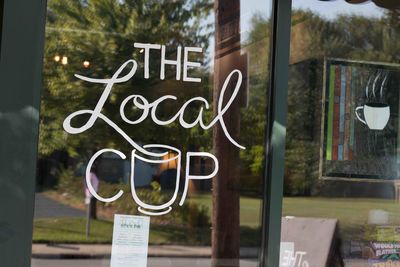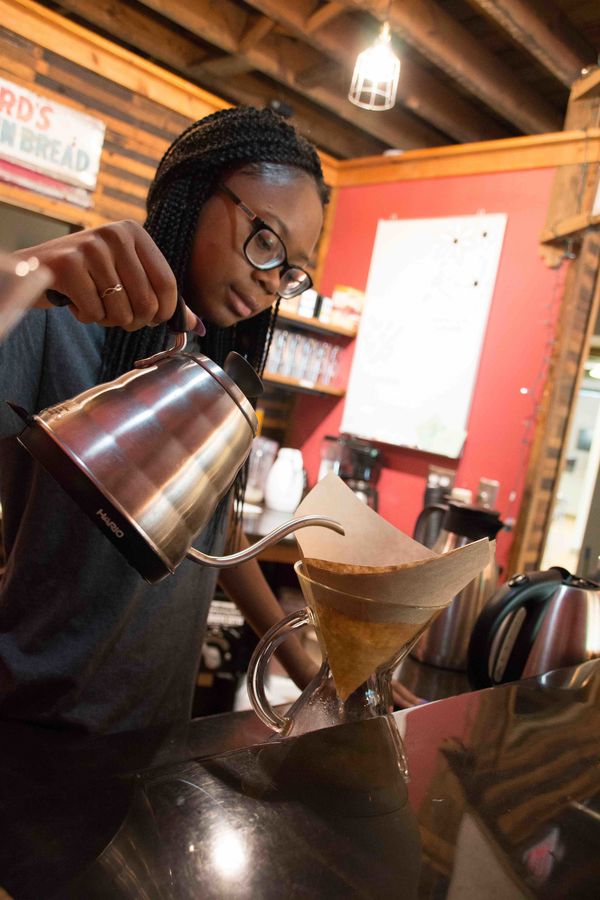Community Development Clinic helps revitalize South Bend neighborhood

When South Bend’s Near Northwest Neighborhood Inc. decided to open a volunteer-run, pay-it-forward coffee shop a few years ago, they turned to Notre Dame Law School’s Community Development Clinic for help.
Residents of the historical area northwest of downtown South Bend knew they wanted to establish a space where people could meet and create a greater sense of community in the neighborhood. They would call it The Local Cup.
But they didn’t know exactly how to set up the venture.
This is the type of question the Community Development Clinic regularly answers for clients. Under the direction of Professor Jim Kelly, the clinic provides free non-litigation services to nonprofits and small businesses. Student interns at the clinic advise, prepare documents, and represent clients in a wide variety of business, nonprofit, and real estate matters.
 A barista at The Local Cup makes pour-over coffee. | Photo by Alicia Sachau
A barista at The Local Cup makes pour-over coffee. | Photo by Alicia Sachau
“We have been working with the Community Development Clinic for over three years, and each student has been an asset,” said Kathy Schuth, the Near Northwest Neighborhood’s executive director. “While they are learning, they are also accomplishing essential pieces of business for us as a community development corporation.”
When opening The Local Cup, the Near Northwest Neighborhood had to consider several factors, including whether to structure the coffee shop as a corporation or limited liability company.
“The students understood the process and were able to advise the NNN on the best option for their new business,” Kelly said. They ultimately established an LLC, and The Local Cup opened in 2015.
The Near Northwest Neighborhood’s focus as a nonprofit organization is on acquiring, refurbishing, and reselling old homes to provide stable housing for low- to moderate-income families. The Community Development Clinic has helped the NNN with this activity, as well.
“Clinic students assist clients with all of the transactional and legal needs for buying these properties,” Kelly said. “Our students work directly with the home buyers and sellers to make sure their real estate transactions are legally sound.”
For example, he said, the paperwork for old homes is often not in order and needs to be sorted through so that new owners can secure clean titles.
Schuth said Professor Kelly’s team has helped the NNN prepare legal documents and acquire more than a dozen properties. “The opportunities with the clinic increase our capacity and our access to expertise,” she said.
The value of experiential learning
The Community Development Clinic is one of Notre Dame Law School’s five clinics.
All of the clinics function as teaching law offices where students work as lead attorneys on real cases under the supervision of seasoned faculty members. Notre Dame Law School considers experiential learning – including clinical experiences as well as externships, skills courses, and immersion programs – to be a core part of a legal education.
While the student interns at the Community Development Clinic are helping make the Near Northwest Neighborhood a more vibrant community and a nicer place for people to live, they are also getting hands-on training as practicing attorneys.
Other projects at the clinic include reviewing charter documents, drafting bylaws and contracts, and counseling clients on best practices for establishing a nonprofit organization or small business. This behind-the-scenes legal work enables people to strengthen communities, create more economic opportunity, and enhance human flourishing.
For example, the clinic recently helped a new small business – a company that provides at-home care for adults – with zoning and land-use approvals for its new property.
Last year, The Wall Street Journal highlighted one of the Community Development Clinic’s most inspiring clients: Green Bridge Growers. The business grows flowers and produce while employing autistic adults. The clinic represented Green Bridge in its formation and in obtaining 501(c)3 status.